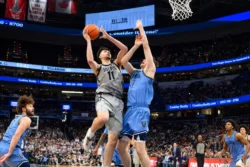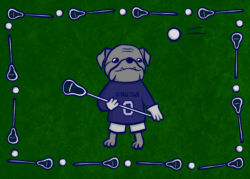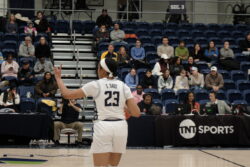Imagine if college students across the nation had the ability to decide your college team’s position in the ranks each week. This became possible last week when two students launched www.studentwriterpoll.com, a ranking system similar to the AP writers’ and Coaches’ polls, that will survey college students to determine NCAA rankings.
Igor Khayet (SFS ’06) used to be one of the students you saw screaming in the student section and, a year after graduation, still goes to games and checks his computer each week to see how his Hoyas are ranked. It was here that he saw a problem with the ranking systems: they poll writers and coaches, but students have no part in the process. So Khayet teamed up with his high school friend, University of Kansas senior Daniel Singer, to create their own poll that considered an exclusively student perspective.

“I think it is arbitrary to have coaches and AP writers do the rankings,” Khayet said. “Students are the ones who wait in line for hours to get tickets, who wake up and drink before 10 a.m. games on Saturday mornings and who follow a team for four years in a row, and not just in March. They are the ones with the knowledge.”
The site will poll a hundred sports editors from college newspapers across the country in order to determine weekly college rankings. The site will also include blogs, articles and a “question of the day” for students to share their opinion on a variety of college sports issues.
Within a week of soliciting contributors, Singer says he has already secured 30 participants from schools as diverse as the University of Las Vegas and Ohio State, and received a verbal commitment from another 20. The Voice has been invited and has signed up to participate in the experiment. He hopes to have a hundred writers contributing by the time they release rankings during NCAA football preseason this August.
When choosing who will represent the students, both men felt that student journalists were a natural choice.
“Sports editors are knowledgeable by trade, selected for their expertise,” Singer explained. “Otherwise the poll wouldn’t be practical. It is a way to generate respectability and weed out bias.”
For sports fan Mike Twomey (MSB ’07), it is that potential bias that would draw him to the site, if not the poll. “As a college student, if I could see a blog from a Vanderbilt paper on why they think they’re going to beat us next week, I would read it,” he said. “ESPN is going to walk a middle line. It would be more interesting to read from someone who has an allegiance as opposed to someone who is just an expert.”
Nick Camarota, a sophomore at Boston University and the sports editor of its paper The Daily Free Press, does not think bias will be a problem. He recently signed up as a contributor and believes student journalists were selected for the poll not only for their knowledge, but also for their journalistic integrity.
“It’s the same thing that keeps the pros from being biased,” he said. “They have their alma maters but they still take their biases out of their voting preferences.”
Camarota also believes that students provide something that pros can’t.
“We see the intangibles,” he explained. “The pros are educated but they rely mostly on stats. Students are more connected. We know the players and know their habits. College writers are working with the players, so they know.”
One thing professionals do have that college players do not is a plethora of time to research all the teams.
“Because student editors are just that—students—they don’t have the time or resources to devote to following every team out there with the same intensity as professional journalists,” Joanna Shapes, assistant sports editor of George Washington University’s Hatchet, said.
Washington Post writer Camille Powel, who covers Georgetown Basketball, says this problem is not unique to students.
“People are always complaining that coaches don’t have time to watch the games,” she said, “I wonder how many AP writers get to see live games. It will be interesting to see how different or similar their perspectives are.”
By establishing themselves during football season, Singer and Khayet hope that by basketball season the poll will be published alongside the very same professional polls that inspired their poll’s creation.
Twomey had his doubts about this.
“To try to put a poll of college sports editors next to experts on the NCAA doesn’t make too much sense,” he said. “The poll itself won’t have too much weight; it is the articles that will get people.”
Camarota agreed. As a fan of other student sports writers’ work, he welcomed what Singer called a “one-stop shop” for student journalism from across the country. Until next August, this will be the meat of the project as Singer and Khayet focus on gaining contributors to create the first poll.





